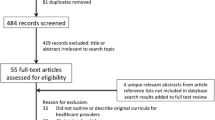Abstract
Cancer is a leading cause of death in Australia and is also the leading cause of disease burden as survivorship continues to improve. Given the prevalence of oncology patients in the community, it is likely to be a condition encountered by every junior doctor. Despite this oncology and in conjunction with that, palliative care has not been a core component of medical curriculum until recently. This means that the junior doctor experience is often complicated by lack of knowledge, poor understanding of the disease process, treatment options and complications and therefore makes managing these patients complicated and often an uncessarily stressful process. This reflective article explores current issues in cancer education, a reflection and comparison between pre- and post-internship experience and offers some potential solutions to these issues.
Similar content being viewed by others
References
Australia, The University of Western. 2016 Oct. The rural clinical school of WA. http://www.rcs.uwa.edu.au/about. Accessed Sept 26 2018
Australian Institute of, Health and Welfare. 2017. Cancer in Australia 2017, ed. Health and Welfare Australian Institute of. Canberra
Barton MB, Bell P, Sabesan S, Koczwara B (2006) What should doctors know about cancer? Undergraduate medical education from a societal perspective. Lancet Oncol 7(7):596–601
Barton MB, Tattersall MH, Butow PN, Crossing S, Jamrozik K, Jalaludin B, Atkinson CH, Miles SE (2003) Cancer knowledge and skills of interns in Australia and New Zealand in 2001: comparison with 1990 and between course types. Med J Aust 178(6):285–289
Blinman PL, Grimison P, Barton MB, Crossing S, Walpole ET, Wong N, Francis K, Koczwara B (2012) The shortage of medical oncologists: the Australian Medical Oncologist Workforce Study. Med J Aust 196(1):58–61
Committee, Oncology Education (2007) Ideal oncology curriculum for medical schools. the Cancer Council Australia, Canberra
Gaffan J, Dacre J, Jones A (2006) Educating undergraduate medical students about oncology: a literature review. J Clin Oncol 24(12):1932–1939. https://doi.org/10.1200/JCO.2005.02.6617
Gysels M, Richardson A, Higginson IJ (2004) Communication training for health professionals who care for patients with cancer: a systematic review of effectiveness. Support Care Cancer 12(10):692–700. https://doi.org/10.1007/s00520-004-0666-6
Koczwara B, Tattersall MH, Barton MB, Coventry BJ, Dewar JM, Millar JL, Olver IN, Schwarz MA, Starmer DL, Turner DR, Stockler MR (2005) Achieving equal standards in medical student education: is a national exit examination the answer? Med J Aust 182(5):228–230
McRae RJ (2016) Oncology education in medical schools: towards an approach that reflects Australia’s health care needs. J Cancer Educ 31(4):621–625. https://doi.org/10.1007/s13187-016-1088-0
Starmer D, Jamrozik K, Barton M, Miles S (2004) Evaluating curriculum changes in undergraduate cancer education. J Cancer Educ 19(3):156–160. https://doi.org/10.1207/s15430154jce1903_9
Starmer DL (2014) Augmenting medical student cancer education through the use of student societies. J Cancer Educ 29(1):9–10. https://doi.org/10.1007/s13187-013-0601-y
Starmer DL, Barton MB (2009) Advances in cancer management: at what cost to medical student education? J Cancer Educ 24(3):233–237. https://doi.org/10.1080/08858190902924849
Statistics, Australian Bureau of (2017) Causes of Death Australia. Australian Bureau of Statistics, Canbera
Tarkowski R, Kornafel J (2014) Students’ scientific society--how to inspire students and help them to become oncologists? A tutor’s perspective. J Cancer Educ 29(1):11–13. https://doi.org/10.1007/s13187-013-0587-5
Author information
Authors and Affiliations
Corresponding author
Additional information
Publisher’s Note
Springer Nature remains neutral with regard to jurisdictional claims in published maps and institutional affiliations.
Rights and permissions
About this article
Cite this article
Langworthy, K. A Junior Doctor’s Perspective on Oncology and Palliative Medicine Education in Western Australia: Comparison Between Graduation and Completion of Internship. J Canc Educ 34, 1038–1041 (2019). https://doi.org/10.1007/s13187-019-1479-0
Published:
Issue Date:
DOI: https://doi.org/10.1007/s13187-019-1479-0



